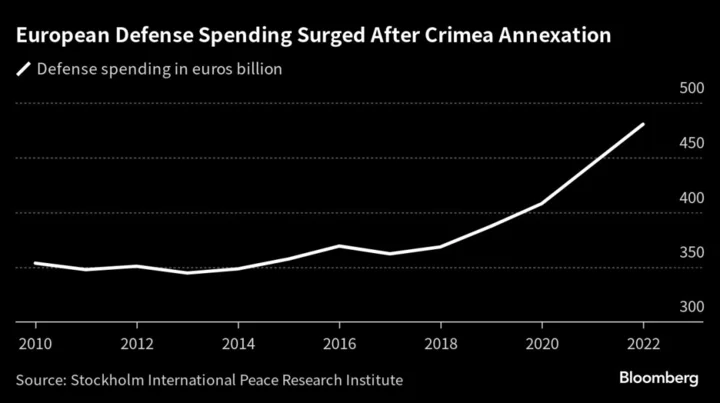One feature that sets the Unimog, Daimler Truck Holding AG’s extreme off-road vehicle, apart from competitors is its ability to drive straight into a wildfire. As the truck moves through flames, jets spray the front windshield and wheels with water to lower their temperature. A specially insulated cabin protects firefighters from intense heat, and a hatch in the roof enables them to operate a firehose from relative safety.
With fire, flood and war ravaging Europe, Daimler is seeing a surge in orders for the Unimog, dubbed the Swiss army knife of vehicles that can cost as much as €250,000 ($264,040). While standard fire trucks struggle to deal with blazes away from surfaced roads, the Unimog, an abbreviation of Universal-Motor-Gerät, or equipment, can cut through unforgiving mountain and forest terrain.
Originally designed to help Germany’s post-war recovery by assisting with tasks like potato picking, it has turned out to be well-suited to more challenging endeavors.
Climate change is behind the increase in wildfires and other disasters linked to extreme weather events. Hot and dry conditions gave way to fires that burned through 800,000 hectares of land in 2022 – more than two-and-half times the average area burned in the previous 15 years, according to data from the European Forest Fire Information System. Europe is also experiencing more intense downpours, with extensive flooding reported in recent months in Bulgaria, Greece and parts of Italy.
Read more: Mercedes Will Make Electric ‘Baby’ G-Wagon, CEO Says
To cope with a wrathful climate, hard-pressed fire and rescue services are turning to the Unimog. “We believe that the number of fires will continue to increase in the coming years,” said Zigmunds Jaunkikis, deputy commander of the National Forestry Corps of Latvia, explaining why the organization is expanding its fleet of Unimogs to 35 from 27 today. “This number would guarantee rapid interventions and allow us to reliably deal with even the most extensive fires.”
Stuttgart Fire Department has made the same bet. The Unimog’s ability to traverse the mountains, valleys, steep slopes and narrow roads of Southern Germany were “a decisive factor during our procurement process,” said fire chief Georg Belge.
It’s equally adept in water. “One of its biggest advantages is its fording ability,” said Franziska Cusumano, head of Mercedes-Benz Special Trucks & Custom Tailored Trucks. “It can drive through flood waters as high as 1.2 metres.”
While the Unimog can now reach speeds of almost 90 kilometers (56 miles) per hour – nearly double the original limit of 50 – the truck’s boxy shape is relatively unchanged from the first models that came off production lines in the late 1940s. Daimler engineers in Wörth, Germany, still assemble the chassis and drivetrain components by hand before sending the vehicles to specialists who outfit the trucks with fire-fighting equipment such as 800-gallon water tanks.
The Unimog is not the only example of decades-old disaster equipment now enjoying a second life under climate change. De Havilland Aircraft of Canada Limited is preparing to restart production of its large yellow firefighting aircraft, dubbed the “superscooper” for its ability to collect water from seas and lakes and, topography allowing, do shuttle runs between them and a fire.
European customers have signed letters of intent for 22 of these aircraft and, with purchase agreements anticipated in the near term, the company believes first deliveries can occur before the 2027 fire season, a spokesman said.
Unimog sales have also gotten a boost from Russia’s invasion of Ukraine, and the subsequent ramp-up in European defense budgets. Germany has supplied Ukraine with Unimogs that have been adapted to serve as everything from ambulances to platforms for rocket launchers.
This isn’t the vehicles’ first time in a conflict zone — only five years ago, pacifist protesters assembled outside Daimler’s annual shareholder meeting in Berlin to protest the company’s export of Unimogs to Kurdish regions of Turkey.
While the recent spike in Unimog sales has so far been uncontroversial, it has created one problem — it’s getting harder to actually buy one. Models are sold out until well into 2024, according to a Daimler Truck spokesperson.

